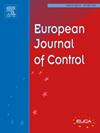Self-learning-based secure control of wind power generation systems under cyber threat: Ensuring prescribed performance
IF 2.5
3区 计算机科学
Q2 AUTOMATION & CONTROL SYSTEMS
引用次数: 0
Abstract
The increasing prominence of wind energy underscores the need to prioritize cybersecurity measures, with a focus on recognizing vulnerabilities and formulating defensive strategies. Specifically, False Data Injection (FDI) attacks targeted at the communication between rotor speed sensors and wind turbine (WT) controllers can disrupt operations, potentially causing drive-train overload and reduced power generation efficiency. To mitigate these threats, this study introduces an adaptive prescribed performance optimal secure control strategy that employs a reinforcement learning (RL) to compensate the detrimental effects of FDI attack as well as actuator fault. To derive the optimal control policy, the complex Hamilton–Jacobi–Bellman (HJB) equation is solved, facilitated by an actor–critic-based RL approach, where actor and critic neural network (NN) manage control actions and performance assessment. To detect FDI attack, an anomaly detection is developed using a fixed-time disturbance observer. Stability analysis is performed using Lyapunov theory which guarantees semi-global uniformly ultimately bounded (SGUUB) of the error signal. To rigorously validate our approach, we implemented the controller using FAST code for the NREL WindPACT 1.5 MW reference turbine. Simulation results convincingly demonstrate the effectiveness of our proposed control strategy, confirming its potential to enhance both performance and security in real-world WT operations.
网络威胁下基于自学习的风力发电系统安全控制:确保规定性能
风能的重要性日益凸显,因此需要优先采取网络安全措施,重点是识别漏洞和制定防御策略。具体来说,针对转子速度传感器和风力涡轮机(WT)控制器之间通信的虚假数据注入(FDI)攻击会破坏运行,可能导致传动系统过载和发电效率降低。为减轻这些威胁,本研究引入了一种自适应的规定性能最优安全控制策略,该策略采用强化学习(RL)来补偿 FDI 攻击和致动器故障的不利影响。为了推导出最佳控制策略,需要求解复杂的汉密尔顿-雅各比-贝尔曼(HJB)方程,并采用基于行动者-批评者的 RL 方法,其中行动者和批评者神经网络(NN)负责管理控制行动和性能评估。为了检测 FDI 攻击,使用固定时间干扰观测器开发了异常检测。利用保证误差信号半全局均匀终极约束(SGUUB)的 Lyapunov 理论进行稳定性分析。为了严格验证我们的方法,我们使用 FAST 代码为 NREL WindPACT 1.5 MW 参考涡轮机实现了控制器。仿真结果令人信服地证明了我们提出的控制策略的有效性,证实了其在实际风电运行中提高性能和安全性的潜力。
本文章由计算机程序翻译,如有差异,请以英文原文为准。
求助全文
约1分钟内获得全文
求助全文
来源期刊

European Journal of Control
工程技术-自动化与控制系统
CiteScore
5.80
自引率
5.90%
发文量
131
审稿时长
1 months
期刊介绍:
The European Control Association (EUCA) has among its objectives to promote the development of the discipline. Apart from the European Control Conferences, the European Journal of Control is the Association''s main channel for the dissemination of important contributions in the field.
The aim of the Journal is to publish high quality papers on the theory and practice of control and systems engineering.
The scope of the Journal will be wide and cover all aspects of the discipline including methodologies, techniques and applications.
Research in control and systems engineering is necessary to develop new concepts and tools which enhance our understanding and improve our ability to design and implement high performance control systems. Submitted papers should stress the practical motivations and relevance of their results.
The design and implementation of a successful control system requires the use of a range of techniques:
Modelling
Robustness Analysis
Identification
Optimization
Control Law Design
Numerical analysis
Fault Detection, and so on.
 求助内容:
求助内容: 应助结果提醒方式:
应助结果提醒方式:


